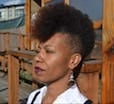
WITS Voices: Editorial Essays in a Time of Trauma
April 28, 2017
By Anastacia-Renee Tolbert, WITS Writer-in-Residence
Lately, I’ve been reading a host of fiction and nonfiction from writers who have come before me, thinking about my mortality and the current state of the world as a woman of color writing, teaching and mothering. So recently, I asked high school students to write editorial essays. To begin with, some cringed at the word “essay” and looked at me as though their poetry teacher had creatively betrayed them. “Essay,” I said, “is not a dirty word.”
After giving them a quick tutorial about cross-genre writing, and about the need for personal opinion to be balanced by facts, I could see some students instantly go into think tank mode—but one student said to me: “I don’t think my opinion is important enough to write a whole essay about it. I mean, I don’t really matter. It doesn’t really matter.”
My heart sank, and I remember yelling inside my head, “YOU DO MATTER; IT MATTERS.” After a short but intense brainstorming exchange with another student, her paper was riddled with ideas and question marks, but when I eagerly asked her what ideas she had been brewing, she quickly retorted, “None of your business.” My heart sank (again), because although she had written enough brainstorm material for two students, something inside of her felt like it didn’t matter enough to share it, not even her topic.
During this lesson, another student said to me, “All the adults want us to focus on our future, but what exactly is our future?” And another: “It’s so much pressure when adults say we are the future. . .” The teacher in me forced me to create two lists—the first, an ongoing list of what matters to me, and the second, a list of ways to help students feel valued and important, especially when they are living in an era where many news headlines are graphically violent, blatantly racist, or just plain old alarming.
I have found that adhering to this second list has helped me be a better teacher and a better supporter for my students:
How To Support Students in a Time of Oh No!
Give them permission to sit with feelings. Don’t ask right away how something makes them feel, their take on it, or what they plan to do about it.
Take a risk and let them know there are times when adults are afraid, confused or overwhelmed, too. Try not to just say, “Me, too.” Give concrete examples or specific feelings.
Honor every student’s individual cultural, religious, and family situation. One issue happening in the world, while it may not affect one student as much, may particularly affect another.
Allow space for free-writing.
Present students with ways or resources for being young activist. If a student hears a teacher say, “You, too, can be an activist,” without any concrete suggestions, this can add to feeling overwhelmed.
Allow space for anger.
Have students write epistolary, or letter, poems to an emotion, issue, person, or place they are concerned about.
Allow time for uncomfortable silence.
Build in a class scream or breathing exercise.
Give students an opportunity to create their own news, or their own perfect world, using poetry, prose or flash fiction as a structure.
Create a space in the classroom where students can sit and process alone for five-minute increments when discussions feel overwhelming, stressful or emotional. (A simple chair in a corner labeled “Time Out Space” works very well.)
 Anastacia-Renee Tolbert is the Writer-in-Residence at Hugo House, workshop facilitator, and multivalent performance artist. She has three forthcoming books: Forget It (Black Radish Books), V. (Gramma Press), and Answer(Me) (Winged City Chapbooks-Argus Press).
Anastacia-Renee Tolbert is the Writer-in-Residence at Hugo House, workshop facilitator, and multivalent performance artist. She has three forthcoming books: Forget It (Black Radish Books), V. (Gramma Press), and Answer(Me) (Winged City Chapbooks-Argus Press).